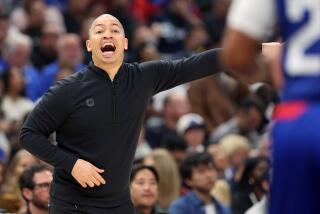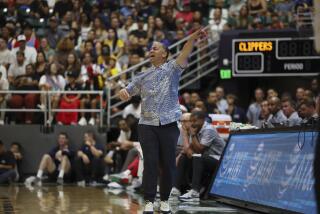Why the Clippers landed Lee Jenkins as executive director of research and identity
- Share via
More than a year before the Clippers set out to take a big swing in 2019 NBA free agency, the team began pursuing top talent of a different type.
General manager Michael Winger invited Lee Jenkins, Sports Illustrated’s lead NBA writer, to the team’s Playa Vista facility near the end of last season. The two had met earlier in the spring to get to know one another, but basketball was barely discussed then.
The GM explained the league’s nuances in stunning detail. Jenkins left feeling he’d learned more in one meeting about the inner workings of front offices than he’d previously understood in 11 years covering the NBA. The team followed up in the summer, with Jenkins joining Lawrence Frank, president of basketball operations, for dinner.
“Once our season ended, Michael and I basically took turns trying to spend time with Lee,” Frank said.
By August, after weeks of conversations that included owner Steve Ballmer and coach Doc Rivers, Jenkins understood the courtship to be serious. He began considering a once-unthinkable possibility: a career change.
“I never thought about this or pursued it,” Jenkins said. “But once they mentioned it, it was exciting.”
The team announced the hiring of Jenkins, 41, as the executive director of research and identity Monday. In media and NBA circles, the title sparked confusion. To Frank, it is almost beside the point.
Jenkins, whose in-depth NBA profiles at Sports Illustrated earned him a reputation as one of the nation’s top sports journalists, clicked so easily with Clippers brass that they believed his skills could benefit the organization in ways that transcend title.
“It wasn’t that, ‘Hey, we need to find this position,’” Frank said. “No. The more interactions we had with Lee we were like, ‘We have to go get this guy.’
“The position was Lee. Who he is was the attraction.”
Frank was coaching the New Jersey Nets and Jenkins reporting for the New York Times when they first met. Now, they will work together toward creating “the ultimate destination where players can really prosper and flourish,” Frank said.
The team will understand next summer just how desirable a destination it is, given the potential to open enough salary cap flexibility to sign two top free agents.
Toward that end, the Clippers believe Jenkins’ hiring could pay dividends. In a narrow sense, he probably will meet with draft prospects to better understand them, Frank said. The Clippers also envision Jenkins helping the organization in larger, and more undefined, ways.
“Usually the quality of the answers you receive is the direct correlation of the quality of the questions you ask,” Frank said. “Lee asks great questions and part of asking great questions is being a great listener.
“He also has this relentless curiosity about him, what makes people tick, what makes teams tick, why do teams win, why do they lose, organizational behaviors. You really can put Lee in any situation and he’s going to impact the environment.”
A handful of writers have traded bylines for behind-the-scenes roles with NBA teams before. Jenkins credited Ballmer for what he called a willingness to think differently and create a job that is “pretty outside the box.”
“I think they are serious about getting to know players,” Jenkins said. “They are exploring that. That’s kind of what I do. That’s what I try to do with my stories. I think they felt like their interest and my passion kind of aligned in that way.”
A San Diego native who lives in Los Angeles, Jenkins was 15 when he began covering sports. He called his decision both “exciting” and “agonizing.”
“I love to write,” he said. “It’s not that I’m saying I’ll never write again. But I think when I do write again, I’ll know a lot more. I’ll be a lot more educated when I’m writing about basketball.”
The Clippers’ pursuit of Jenkins began without specific responsibilities in mind. If feedback Frank has received from his peers across pro sports since Monday is any indication, other teams could show interest in considering similar roles.
“The first question is, ‘How did you guys get that done?’” Frank said. “The second thing is, ‘Hey, my owner may be asking me next.’ Other people may be able to, quote-unquote, fill a role similar, but to us, there’s no other Lee Jenkins. That’s what makes Lee so unique.”
Twitter: @andrewgreif
More to Read
Get our high school sports newsletter
Prep Rally is devoted to the SoCal high school sports experience, bringing you scores, stories and a behind-the-scenes look at what makes prep sports so popular.
You may occasionally receive promotional content from the Los Angeles Times.







